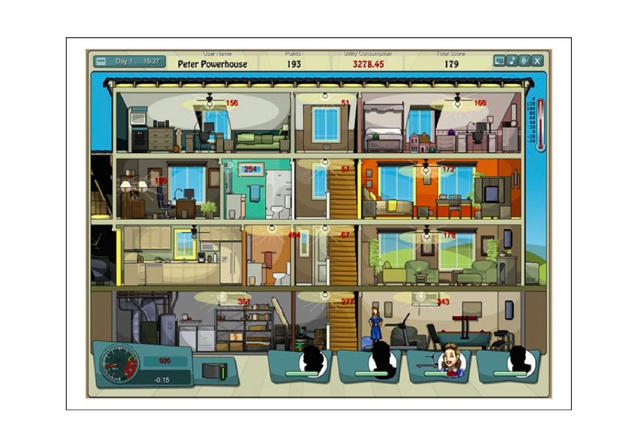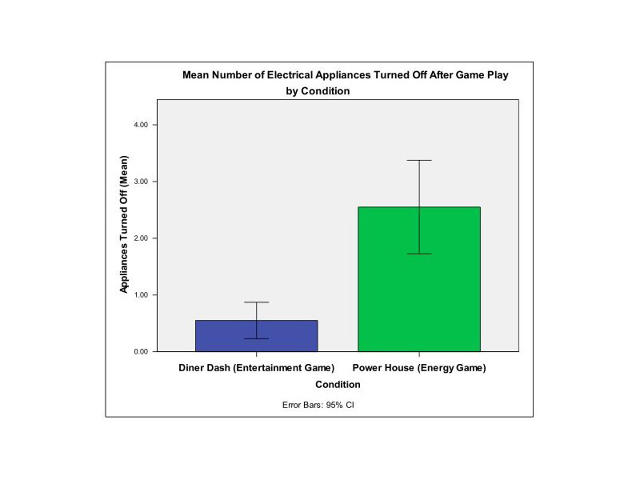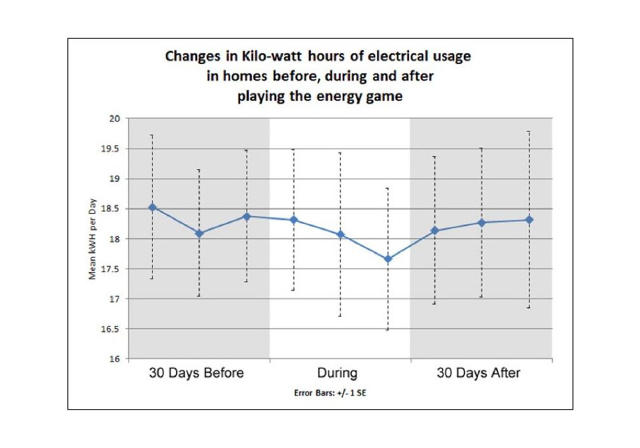If you're looking to waste some time today—and since you're reading this column, that's a pretty safe bet—check out the online strategy game Power Houseon Facebook. The premise may not sound that exciting: guide a family of four through a series of everyday household tasks using as little electricity as possible. But Power House is addictive and challenging, and better yet, it could save you money on your next utility bill.
You read that right. As it happens, Power House was developed by researchers with the explicit goal of getting players to reduce their energy consumption in the real world. And it seems to have worked. In the January 2015 issue of Environment and Behavior, communications scholar Byron Reeves and three Stanford colleagues report that people who played Power House demonstrated more energy-efficient behavior immediately afterward—both in a lab and their own homes.
"Taken together, the experimental and field results demonstrate that energy information embedded in an entertaining game, one that parallels the features and goals of commercially successful applications, can change energy behavior," Reeves and company conclude.
In Power House, players move a family through its virtual home (below) to do things like wash the laundry, make coffee, and uh, even use the toilet. The goal is to conserve as much electricity as possible by turning off appliances and lights. Sounds easy enough, but here's the catch: The family won't move through a dark room (meaning you need to keep the light on or the shades open), and if you use too much power at once the circuit shorts. As the game progresses, more family members enter the house at the same time, making it even harder to juggle these goals.

To study whether or not Power House truly improved energy behavior, the researchers brought 40 test participants into a lab. There were five running appliances in the office where the experiment took place: two overhead lights, a floor lamp, a desk lamp, and a computer. Half the participants played Power House, while the other half played the hit time-management game Diner Dash, which centers on food service.
After participants had played for 30 minutes, experimenters told them to close up the office and leave, without giving more detailed instructions. Then the researchers went back and counted how many appliances had been turned off. They found Power House players to be significantly more power conscious than their Diner Dash counterparts—turning off an average of 2.55 of the five appliances to .55 appliances, respectively (below).

Even more impressive is that the behavioral improvement seemed to occur "without any conscious connection between game play and subsequent energy behaviors," according to Reeves et al. During experimental debriefing, none of the participants connected the office appliances to the Power House experience.
Finding behavioral change in an isolated laboratory study is nice, but the researchers still wondered whether playing Power House could have an impact on energy use in an actual home. So they worked with California utility provider PG&E to recruit 51 adults for a field test. These field test participants performed a series of tasks within Power House during 10 total game sessions over 17 days—with their household energy use tracked by PG&E all the while.
The results were not as impressive as those found in the lab, but intriguing nevertheless. Reeves and colleagues report a moderately significant 2% decline in household energy use during active Power House game playing-period, compared with consumption measures for a month beforehand and afterward (below). Not a huge number, for sure, but encouraging enough to pursue the gamification of energy use further—either through standalone games like Power House or by embedding environmental tasks in games with other goals—in the eyes of the researchers.

"[T]he prospect of even low single-digit reductions in electricity usage across potentially millions of game players would likely justify the expense of building and marketing an entertainment product that cost only thousands of dollars to produce," they conclude.
The field tests aren't perfect. Since everyone in a household uses power, it's hard to know whether the player's behavior directly caused any change. Longer studies would be needed to see whether the changes would hold true over time. In an effort to boost the experimental numbers, Power House now encourages players to log in via their PG&E account (offering them the chance to win a year's free electricity). If the game works, then you'll be a better citizen and save money.
And if it doesn't, well, there are far worse ways to spend a half hour.